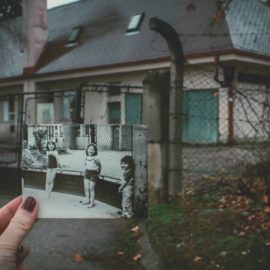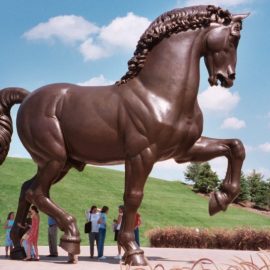

This article is an excerpt from the Shortform summary of "Hillbilly Elegy" by JD Vance. Shortform has the world's best summaries of books you should be reading.
Like this article? Sign up for a free trial here .
What is JD Vance’s mother like in Hillbilly Elegy? How does she impact her life, and how does he escape the cycle of poverty and violence that traps her?
JD’s mother had once been a promising student and seemed on track to rise up from the poverty and abuse that had surrounded her as a child. Unfortunately, she fell into the same cycle of dysfunctional that she had learned from her parents. She married her high school boyfriend and quickly found her life beset by the drama, fighting, and violence that had so defined her parents’ marriage. We’ll cover the life of JD Vance’s mother and her relationship with her son.
JD Vance’s Mother: A Tumultuous Life
At nineteen, JD Vance’s mother gave birth to a child (JD’s older sister Lindsay), filed for divorce, and began life anew as a single mom. After remarrying in 1983, she gave birth to JD in 1984, in Middletown.
The War At Home
JD’s father was a man named Don Bowman, his mother’s second husband. JD remembers little from his early childhood before the age of six, but he does recall one particularly vivid memory from this period.
One day, JD Vance’s mother picked him up from kindergarten and told him, quite matter-of-factly, that he would never see his biological father again. Bev Vance’s explanation was that his father “didn’t want him anymore” and wanted instead to give him up for adoption. This would be the first in a long series of father-figures who would come and go from JD’s life, a product of his mother’s inability to form stable relationships and her extreme willingness to jump into living arrangements with men she barely knew—a pattern of tumult and instability that would become a constant source of pain and anxiety for JD and Lindsay.
Marital Discord
JD was legally adopted by his mother’s next romantic partner, a man named Bob Hamel. While he treated the children kindly, Bob embodied so much of the hillbilly culture that Mamaw and Papaw had desperately wanted their children and grandchildren to steer clear of.
Bob had children from a previous marriage (with whom he had a minimal relationship), suffered from poor dental hygiene, lacked even a high school education, and made his living driving a truck. Looking back on Bob, JD describes him as “a walking hillbilly stereotype.”
JD had an early childhood exposure to his mother’s pattern of unstable and unhappy relationships with men. JD was forced to witness frequent screaming matches between JD Vance’s mother and adopted father; physical violence between the couple (with the one stipulation being that Bob couldn’t hit first); and brutal verbal abuse.
There was also a reckless financial profligacy and a total lack of regard for saving and thrift, behavior that JD would come to see as a consistent feature of hillbilly culture. This was despite the fact that the household income exceeded $100,000: hardly a small sum in rural Ohio. Bev Vance and Bob racked up thousands of dollars in credit card debt, spending lavishly on items that they didn’t need, like new cars, new trucks and even a swimming pool. The deteriorating financial situation hastened the demise of this fragile marriage. Bob and Bev separated and another father figure in JD’s life (his legal father in this case) was gone.
Needless to say, all of this began to take a toll on JD. His grades at school declined and he began to put on weight, while suffering from severe stomach aches. He also had trouble sleeping, out of fear of being awoken by the stomping, yelling, and smashing of furniture that had defined so much of his young life up to this point.
Normalizing Dysfunction
As an adult, JD doesn’t point to the domestic abuse itself as the most harrowing aspect of living with his mother and Bob. Instead, it was the uncertainty that was the most unnerving. He could never be sure what might trigger a knock-down, drag-out brawl. Even seemingly innocuous events—a wrong word here, a mild childhood transgression there—could provoke a plate being smashed or a door being kicked in.
As JD sadly reminisces, however, his domestic situation was hardly exceptional. These behaviors were quite normal and widespread in his community. After a while, seeing families hurl barbed insults at one another and engage in acts of physical violence ceased to be shocking: it was simply a part of life for JD, his sister, and their friends. He came to believe that this was just the way that adults treated one another.
Social Vs. Economic Mobility
What Bev Vance’s marriage to Bob embodied, to Mamaw and Papaw’s dismay, was a lack of generational progress. While Mamaw and Papaw themselves lacked formal education and had experienced teen pregnancy, substance abuse, and domestic violence, they always expected that the next generation would do better. They wanted JD Vance’s mother to succeed where they didn’t.
This was core to their belief in the American Dream: that those who worked hard could achieve anything. Mamaw and Papaw, for all their flaws, worked tirelessly to give their children and grandchildren access to opportunities that they themselves never had. Mamaw always encouraged self-reliance: she cautioned JD to never be like the “fucking losers” who thought that their fate was beyond their control.
Bev Vance’s marriage to a hillbilly stereotype like Bob showed Mamaw and Papaw that on some level, they had failed their daughter and grandchildren. What this illustrates is the distinction between economic mobility and social mobility. The Vance clan had certainly achieved the former: they were earning money well above and beyond what they could have in Kentucky. Even Bob made a comfortable living driving a truck.
But this newfound (relative) wealth never translated into true social mobility. Bev carried forward all the destructive social attitudes and dysfunctional modes of conflict resolution that she had learned from her childhood and that her parents had brought with them from their hillbilly culture in Kentucky. They may have been living a life of comparative material comfort, but the family was still saddled with the same harmful social values and norms.
JD Vance’s Mom: Her Situation Accelerates
Although her marriage with Bob was loveless and marked by verbal and physical abuse, its deterioration clearly took a powerful emotional toll on her already-fragile and unstable psyche.
JD Vance’s mother began to turn to drugs and alcohol, and started having numerous affairs with strange men who would suddenly appear and then disappear from JD’s life. As a result, JD and his sister grew having no idea of how a man ought to treat his family and without any true father figure at all.
Things came to a head when she tried to kill herself by crashing her car into a telephone pole. When she was released from the hospital, things only deteriorated further. The kids got a full view of the extent of their mother’s dysfunction, as she would stay out all night with new friends that JD and Lindsay had never met before. She would also subject them to extreme emotional outbursts and episodes of physical violence.
Things lingered in this state for a few months, until an event took place between JD and his mother that forever altered their relationship and showed JD just how toxic his mother had become.
A Watershed Moment
After one of his mother’s characteristic outbursts, she decided to make it up to her son by taking him out to buy some football cards. During the ride to the mall, JD said something to her (he doesn’t recall now what exactly it was that he said) that set off his mom’s trigger-hair temper.
She reacted with a level of fury and violence that even JD, for all he’d seen, could hardly fathom. She accelerated the car and threatened to kill the both of them, then pulled the vehicle over and attempted to savagely beat her son.
JD managed to escape the car and run to a nearby house, where the woman at home called the police. Before the police arrived, Bev Vance had managed to kick down the woman’s door and drag JD, who was screaming for help, onto the front lawn. Bev was ultimately arrested, violently resisting as the cops put her in the squad car.
In the aftermath, JD Vance’s mother would retain nominal custody of the children, but with the tacit agreement that JD could live with Mamaw whenever he wished.
JD Vance’s Mom Spirals (Again)
For JD Vance’s mom, the loss of her father inflicted a terrible blow on her already-fragile mental state. She quickly spiraled into a deep depression.
Her notorious temper also began to flare up again. Mild “provocations” like unwashed dishes would prompt outbursts in which she would scream at her teenage children, “I’ve lost him and you’re not making this any easier!” She was simply unable to accept anyone else’s grief over the loss of Papaw.
Soon, Bev Vance’s behavior began to take a turn for the worse. JD Vance’s mother was arrested during a domestic squabble with Mamaw that (once again) spiraled out of control. She also started abusing prescription drugs—to which she had easy access as a nurse—around this time, stealing from her patients to feed her addiction. Ultimately, she was fired for rollerblading through the emergency room. Evidently, her substance abuse had altered her mental state to the point where this seemed like a normal and appropriate thing to do.
JD Vance’s mother was transformed into a person completely unable and unwilling to conform to the basic norms and standards of adult behavior. Eventually, she had to go to rehab in Cincinnati, where JD and his sister Lindsay would visit her on weekends. These visits showed JD the true horrors of American addiction, but they also gave him key insights into why JD Vance’s mom was the way she was. For example, she revealed to him that she had turned to drugs to escape her financial stress and to cope with the loss of her father.
The family therapy sessions at the treatment center also brought to light resentments and wounds that had been long-simmering between Bev and her children. One weekend, Lindsay confronted her mother about how much she hated watching her little brother (JD) get attached to one of Bev’s boyfriends, only for the boyfriend to suddenly disappear from JD’s life.
A “Disease?”
JD also became acquainted with the idea of addiction as a disease during this time. According to this theory, being an addict was a disease that simply afflicted certain unfortunate people. Just as you couldn’t judge a cancer patient for having cancer, you couldn’t judge a drug addict for their behavior: they were sick.
At the time, JD found this concept absurd and was opposed to its broader implication—that his mom wasn’t responsible for her actions and that it would be wrong to hold her accountable. As an adult, JD now does acknowledge that there is a biological and genetic basis for addiction. But the disease concept of dependency still strikes him as not quite right: to him, the idea only reinforces the worst tendencies of hillbilly culture and provides an excuse, and even justification, for antisocial behavior.
JD Faces a Test
Once JD Vance’s mother was discharged, her pattern of erratic and unstable relationships quickly resurfaced. She took up with a constant parade of new men, and JD was forced to change homes frequently. What was most painful was the instability and tumult: he was always surrounded by strangers, always in a new place, and cut off from everyone he knew and loved.
Thankfully, he was able to remain in school in Middletown and was able to visit Mamaw and his sister and her husband whenever he wanted. This provided him some measure of stability. But his mother’s romantic life was increasingly chaotic, even by her standards. JD and Bev ended up moving in with a man she’d gone on a date with just a week before!
The instability of this latest situation exerted a heavy toll on JD. He nearly flunked out during his freshman year of high school and was struggling to even maintain a 2.0 GPA. He was also starting to experiment with marijuana and alcohol, taking the first steps down the same path that JD Vance’s mother had.
During this time, Bev’s substance abuse got worse, and her emotional toll on the rest of the family was about to come to a head. One day, she demanded that JD give her a jar of his clean urine so she could pass a drug test. This floored JD. He saw how completely entitled she was, expecting that he would just help her cheat on a drug test, like it was some basic responsibility he owed her. She was also utterly remorseless at having broken her promise to remain sober.
JD even told Mamaw to her face that she was responsible for Bev’s amoral behavior, arguing that if she’d put her foot down decades ago, Bev wouldn’t be at the low point of asking for her son’s urine. Ultimately, Mamaw convinced JD to relent and give his mother what she needed to pass her drug test.
But this was truly a last straw for both JD and Mamaw. JD could never go back to living with her after what she’d pulled. He moved in with Mamaw, where he would remain until he moved out after high school.
Making Peace With Mom
JD knew he had to change his thinking, to stop seeing disagreements as struggles to the death, stop using words as weapons, and stop thinking of apologizing as a form of weakness and surrender. To do this, he needed to finally make peace and come to terms with the person who had caused him more grief and anguish than anyone: JD Vance’s mother.
JD had been out of regular contact with his mother for a long time by this point. He had run the gamut of emotions toward her, but mostly, he was angry. He was angry that her addictions had robbed him of so much of his childhood; and he was angry that she had failed to model good adult behavior for him, forcing him to do it all on his own.
But he now realized that he had never tried to empathize with her, to understand what it was like to be her. Years ago, he had rejected Bev’s 12-step platitudes about her substance abuse being a disease. He had seen it as a shameful cop-out, an abdication of any responsibility for the situation she had put herself—and her children—in.
But JD’s thinking had evolved. Was Bev Vance an out-of-control narcissist, or was she really just a product of her culture? What self-destructive values had she learned from her own childhood?
In the end, JD saw that it was a mix of both. Given what he now knew about ACEs, it was obvious to him that Bev had clearly suffered from severe emotional trauma during her childhood. Her experiences of seeing her father’s alcoholism and her parents’ volatile marriage had to have had some impact on the course her life took as an adult. But he also placed personal responsibility front-and-center. Bev was hardly a villain, but she deserved much of the blame for what she inflicted on her children.
Never Turn Your Back
JD’s new attitude toward his mother would once again be put to the test when she turned to a new drug: heroin. This time, however, JD worked to help his mother get on her feet. Following the advice of Usha’s father, he was practicing empathy rather than turning his back.
He checked her into a Middletown motel to help her avoid homelessness and monitored her finances to make sure she stayed on track. He was acting more like a parent to her, as if she were his child. And he accepted his limits: he couldn’t solve all of his mom’s problems, she had to fight some of her battles on her own. But he also saw that he couldn’t turn his back on family, no matter how much they disappointed or hurt him.
———End of Preview———

Like what you just read? Read the rest of the world's best summary of "Hillbilly Elegy" at Shortform . Learn the book's critical concepts in 20 minutes or less .
Here's what you'll find in our full Hillbilly Elegy summary :
- The hallmarks of hillbilly culture and why they hold people back
- How JD Vance broke out of his hillbilly childhood and graduated from Yale
- Why the author thinks hillbillies might be beyond saving







And he is a jerk now, blaming immigrants because his mother was a drug user. He has never transcended his past, he is lying to create hatred towards a group of people for the faults of his mother.
So true. I hate he won his political race. We just really needed another nutso trump boot licker in congress. 🙁